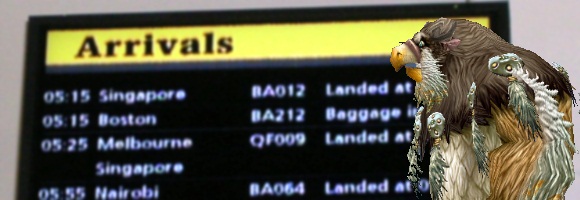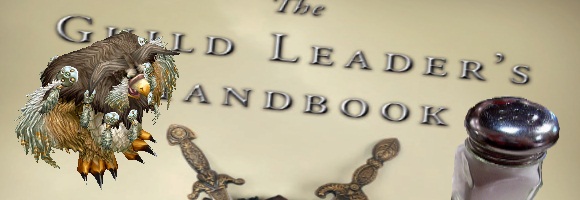Quick summary: When the announcement was made that 10mans and 25mans would be on the same loot system, I cheered. All things considered, I just enjoy the feeling of 10mans more. More responsibility on each member, the boss fights can be less forgiving. Because of work reasons, I had to take a break from Unpossible, Lodur’s guild. As much as it pained me to lower myself to the bench, it needed to be done.
In that time, I’ve been pieceing together a 10man team that will be Cataclysm ready. Starting with a core group of players that I’ve been gaming with since Pre-BC, it’s starting to flourish. And now, the tale begins…
First Incident
We’re keeping it simple. As our guild name implies, this is a Team Sport. Everyone plays a role. Those of us that are “raid leading” are putting forward the effort to bring these people together. We’re not the “you need #### gear score” or the “link acheivement” type. As I’ve posted before, it’s more about the people than the gear/class/loot. I’ve downed Arthas on 10man normal with Unpossible, but killing Putricide with my friends gave me an even bigger rush. It may sound crazy, but it’s true.
We’ve been doing what we can to accomodate schedules. We’ve found that Tuesdays and Thursdays yield the most guildies. So, I put up the signups on the calendar. People click Accepted/Declined/Tentative. If they click Tentative, all I ask is that they contact me when they know ‘yay’ or ‘nay’. They all have my email, as well as my cell phone number. This leads me to “Kevin” (not his real name).
The first time Kevin signs up for raid, he lists himself as Tentative. After being a random no-show, the next time I see him, I simply say, “Hey Kevin, sorry we missed ya Tuesday. If you sign up as Tentative, would you mind shootin’ me a text when you know if you can or can’t make it?” He replied, “Dude, that’s why I signed up Tentative.” “I know,” I respond, “but I just need to know if we’re waiting for you or moving on.” “Oh yeah, sure. Sorry man,” was his final quote.
Second Incident
Kevin signs up for the next night as Tentative. Totally cool. Obviously, real life takes precedence over WoW, and it should. Time ticks down to the first pull of the raid night. No text from Kevin. No email. No in-game mail. His status still listed as Tentative. So, I text him. His girlfriend has been sick, and he’s taking care of her. “Oh, sorry to hear that. Awesome you’re taking care of her. If you could just shoot me a text if you know you’re not gonna make it, that would help out a lot.”
His reply: “Yeah of course, no problem.”
Third Incident
This time, Kevin signs up as Declined. He sends me a whisper, “Hey, I’m signing up as Declined because I’m not sure I can make it or not.” I say, “Cool, we’ll count you out for the night. If that changes and you can come, just text me and we’ll see what we can work out.” “Yeah cool!” is all he says.
Raid starts a little late because our MT got bogged down with work and needed time to do it. We grab a couple new Applicants to the guild, a few of our usual non-guild friends we raid with, and we set off into ICC to at least get through the first wing.
Approximately 3 hours after the raid was scheduled to start, Kevin signs on. “Hey guys, how goes ICC?” “Pretty awesome, actually. We just started,” I answer. Raid continues, we only get through Saurfang with the 45 minutes we had before we started losing people to family, work, sleep, etc.
Face-off
After the raid is over, I get a whisper from Kevin. Here’s essentially the conversation:
Kevin: “Hey man, whatever happened to Team Sport?”
Me: “Not sure what you’re getting at.”
Kevin: “You had 3 Applicants and 2 PuGs in there. What happened to full members getting priority?”
Me: “Well, you signed up as Declined, and didn’t let us know you were coming.”
Kevin: “The Team Sport I know would boot one of the Applicants or PuGs to get a full member in there.”
Me: “Actually, that’s not the way it’s been. If you would’ve given advance notice you were coming, maybe we could’ve work ed something out. I’ve made myself available for you numerous times to get in touch with, and you haven’t taken advantage of it once. Just because you wear the tag is no guarantee, Kevin.”
Kevin: “Whatever dude, I’m out”
**Kevin leaves the guild.
You get the point. I was also called selfish, and accused of not caring about the Team. In actuality, it’s because of this team that we’re trying to make it work. The core of us could go anywhere to raid. We could join random guilds just so we could see and conquer the endgame content, but it’s not how we want to do it. Building and filling out this group is vastly more important to us. If other guild members are up to the task, awesome. If not, no big deal, there are other options to explore.
There’s only so much reaching out we can do. We can’t do much for people that don’t reach back.
TL;DR – Raid Leading is hard.
**If you’re interested in possibly becoming a part of this team, email me at the link provided below. We’re building a small 10man group of talented and friendly team players. Particularly looking for dps with off-specs in healing/tanking. Even if you don’t fit that bill but are still interested, email me all the same**
Email: Elder.Thespius@gmail.com | Twitter: @Thespius




